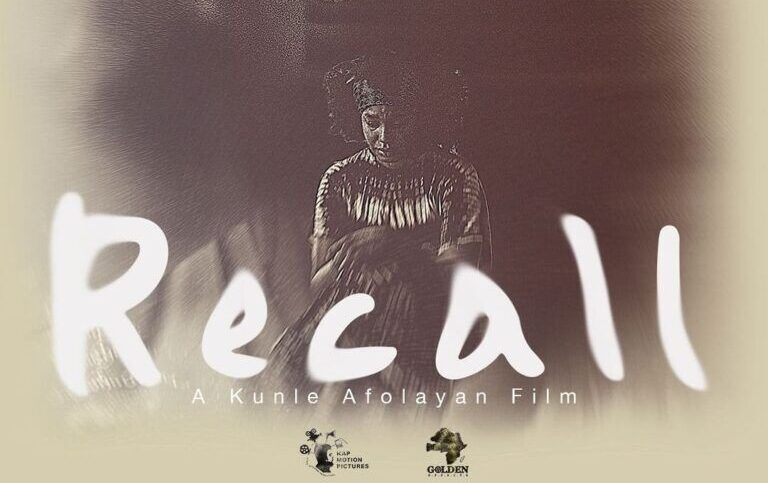As it lacks any defining moments, Recall is a film that will be difficult to recall.
By Joseph Jonathan
Loss is an inescapable part of life; a sharp, lingering ache that reshapes our existence in ways we can never fully prepare for. Most people associate it with death, the irrevocable absence of a loved one. But what of the losses that happen within us? The erasure of memories, the slow fading of moments that once defined who we were? To forget is its own kind of grief, one that leaves the forgotten stranded in the past while those around them struggle to bridge the gap between what was and what remains.
In Recall, Kunle Afolayan plunges into this haunting reality through the story of Anita (Sharon Ooja), a woman who wakes up a day after her lavish wedding anniversary party with no memory of the last ten years of her life, including her marriage to her husband, Goke (Olarotimi Fakunle) and their children.
As her husband and children grapple with the agony of loving a stranger who was once their anchor, the film teases a few questions: Is her condition a twist of fate, a medical mystery, or something far more supernatural?
As intriguing as this premise sounds, the story unfolds in a rather uninspiring way, dragging on for its 1hour 28 minutes runtime. While the film is quick to dispel Anita’s memory loss as a medical condition, with the family doctor implicitly suggesting seeking spiritual help, it doesn’t do enough to build the stakes for a deeply laden supernatural thriller.

African spirituality is a theme that has come to define Kunle Afolayan’s filmography, from the moral reckoning in Irapada (2006) to the cursed artifact of The Figurine (2009) and the mythic tragedy of Anikulapo (2022). His films thrive on ambiguity, masterfully blurring the lines between supernatural forces and human choices, leaving audiences to wonder where divine intervention ends and human folly begins. The Figurine, for instance, lingers in the mind precisely because it refuses easy answers, trapping viewers in a gripping conundrum of fate versus free will.
However, Recall lacks this key element that drew audiences to the aforementioned films. Instead of weaving its spiritual undertones into a layered narrative, the film reduces its themes to a superficial backdrop.
Gone is the haunting uncertainty of his earlier works; in its place is a predictable story about memory loss that prioritises melodrama over mystery. For instance, where The Figurine left us questioning whether its tragedies stemmed from a cursed sculpture or the consequences of human greed, Recall spoon-feeds its audience a spiritually neutered resolution that feels all too convenient and very predictable.
This problem is largely due to the fact that the film rather than build its mystery and suspense with proper backstories for each character, spends too much time on scenes that add nothing to the story–it is as though the film loses memory of what its story is about and when it finally gains recollection, it is a tad too late, unlike its main character.

Despite the pedestrian storytelling, there are fleeting moments where Recall hints at something deeper; how grief lingers when memories are one-sided, how hope can twist into delusion (evident in Goke’s stubborn display of family photos), or how it is “unwise” to show off one’s success to the public (and inadvertently attracting haters). Unfortunately, these ideas are never fully realised, leaving the audience with unanswered questions and unfulfilled potential.
If the storytelling lacked soul, the performances–which are a mixed bag–lacked depth. Ooja struggles to convey the depth of Anita’s confusion and uncertainty, often resorting to exaggerated expressions rather than nuanced emotion.
For the most part, it is as though she’s unaware of what expression each situation requires, which makes her rather frustrating to watch. Fakunle, who is done no favour by an unfortunate set of fake buck teeth, does his best with the thinly written character that is Goke. Despite his best efforts, his portrayal leans more toward melodrama than genuine heartbreak.

The inexperience of the two child actors is glaring in the film and that is no fault of theirs but the director who failed to provide adequate guidance and direction to bring out the best in their young performances, resulting in awkward delivery and unconvincing portrayals that detract from the film’s overall impact.
This is not the “glorious” return to cinemas that audiences have anticipated from Afolayan who has been away from the big screens since 2019. What could have been a deep dive into the fragility of memory, the weight of forgotten love, or even the sinister forces at play instead becomes a tepid drama bogged down by unnecessary scenes, stilted dialogue, and a finale that feels all too predictable.
As it lacks any defining moments, Recall is a film that will be difficult to recall.
Rating: 1.3/5
Joseph Jonathan is a historian who seeks to understand how film shapes our cultural identity as a people. He believes that history is more about the future than the past. When he’s not writing about film, you can catch him listening to music or discussing politics. He tweets @JosieJp3.



